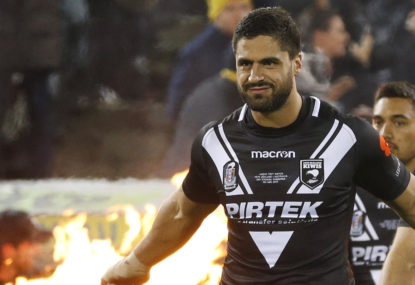WATCH: Did Souths get away with dubious try in another controversial grounding decision?
Fans were sceptical that Izaac Tu'itupou Thompson grounded this properly. How did you see it?

The latest drugs fiasco engulfing the NRL has raised many questions. Not necessarily about the game itself, because the same is being asked of the AFL.
Currently, Australian sport seems to be lacking real leadership in administration.
Both codes have issues with sexism and misogyny, and that’s an issue worth its own focus, while the NRL is marginally in front in tackling racism, compared to the AFL – the NRL has also been on the front foot in terms of its support for the LGBTIQ community, lead by former league star Ian Roberts.
The AFL has also to its credit implemented a Pride Game, at the initiative of the Sydney Swans and St Kilda, last year.
Some keep groaning both games are getting too political, yet the reality is sport and politics will always mix.
The illicit drugs issue is one which threatens to destabilise clubs and integrity of both games, because one, it’s a player welfare issue, and two, it’s overshadowing the achievements of both clubs and players.
2005 Swans premiership captain Barry Hall believed the West Coast Eagles 2006 flag was tarnished as a result of the Eagles alleged drug culture. Ben Cousins and the tragic overdose of Eagles premiership star, Chris Mainwaring, made it a hard issue for both the club and the game to sweep under the carpet.
In the NRL, the Cronulla Sharks are now faced with a similar dilemma. While the NRL’s latest drugs drama just doesn’t involve the Sharks (it’s rocked the Sydney Roosters and two stars from the Melbourne Storm) it is bitterly disappointing for the Shark’s long-suffering supporters.
Cronulla needed its chairman, Damian Keogh, allegedly being caught with cocaine like a hole in the head. This was on the back of Ben Barba being charged with possessing the same substance after the grand final. And then for promising Under 20s Sharks forward, Jesse Savage, to be also be charged for alleged possession has undone the club’s reputation, which had been rebuilt since the ASADA scandal. Losing its million dollar sponsorship is also a massive blow.
In the AFL, the Sydney Swans had to stand down defender Michael Talia after he pleaded guilty to cocaine possession.
Australia’s two leading codes need to take a united approach on this front and implement a zero tolerance attitude to drugs – That means no strikes.
All strikes do is allow for complacency. Life bans are not the answer, however, a two-year ban would suffice, with the option of the player being able to return provided they have been fully rehabilitated and have evidence to support they have taken steps to have a completely drug free life: socially, academically, and vocationally.
Administrators convicted of drug possession should be suspended immediately.
While experts are saying both games need to tread carefully in naming and shaming players, what neither game can afford is to have more Ben Cousins or Ben Barba-like scenarios.
The shaming is actually done by the media, not the club or the game. Drug addiction usually is a link to a major life problem, such as mental illness, and I write this as a recovering drug addict and know the devastation it causes within family and friend circles.
While the media does what it does to sell papers, the clubs and the games have to do all they can to ensure players get support and education on drug use.
Ultimately the responsibility lays with the player with the addiction, and the sooner the NRL and AFL take a tougher approach towards illicit drugs the problem will always be there.